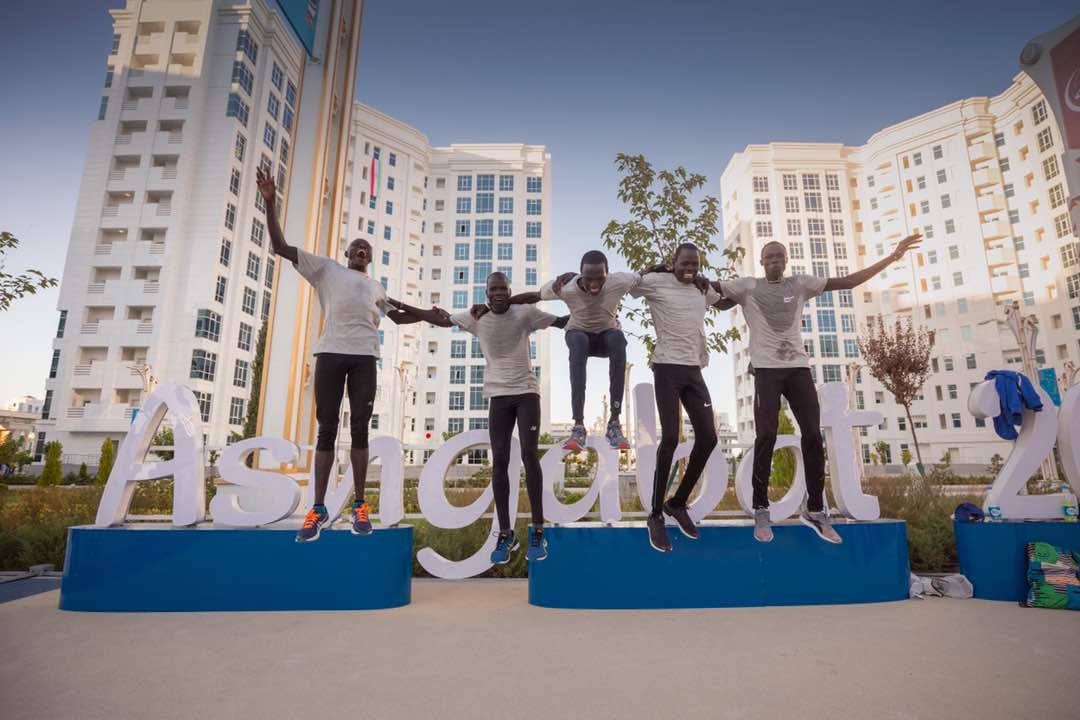“I have learnt a lot from the Asia games because it is my first time to participate in international games and am happy that I qualified for the finals.”

Five South Sudanese refugee athletes have arrived from Kenya to participate in the 2017 Asian Indoor and Martial Arts Games (AIMAG), taking place in Turkmenistan's capital, Ashgabat.
The refugees who took part all live in Kenya, but are originally from South Sudan. Yiech Pur Biel and Gai Nyang Tap ran in the 800 metres. Wiyual Puok Deng ran in the 400 metres. And Paulo Amotun Lokoro and Ukuk Uthoo in the 1500 and 3000 meters, respectively.
The athletes say the competition has been an incredible experience for them so far, as the Games are the biggest sporting event in the history of the region, with over 5000 athletes from 60 countries competing.
They say competing here is giving them the opportunity to learn from and interact with other professional athletes and champions from the Asia region.
During the competition, which kicked off on September 18, one of the first refugee athletes to compete was Yiech Pur Biel.
Pur competed at the Rio Olympics in 2016 in Brazil, the first time in Olympic history refugees from around the world formed a team. He says that experience prepared him for what he’s experienced at the current Games in Ashgabat.
In Ashgabat, Pur first came 4th in his 800 meters heat with a time of 1.55.29. That time took the 22-year old through to the semi-finals, where he came 5th. Pur says his experience at the Games has given him new ideas on how to work to improve his training with a view to improving his time.
“Am happy to have had the opportunity to compete at the Asian Games. I am of course really disappointed that I did not make it through past the semi-finals. But I am glad to have at least gotten to the next heat. I realise now that I have to simply train harder to achieve my goals.”
Ukuk Uthoo says he totally surprised himself with his performance at the Games. This was the first international competition for the 24 year-old runner who grew up in a refugee camp.
He says he’s thrilled and still can’t believe he managed to make the final of the 3000m. During the first heat of the 3000, Ukuk came 5th out of 9 contenders in a very competitive field of made up of athletes from countries like China, Qatar and India.
Ukuk’s performance took him to the final round where he came in 7th out of 12 finalists, with a time of 8.33 minutes.
Ukuk says he was disappointed not to have won a medal, but was pleased to make the finals. He says he knows he has to now focus on working on his running technique to enable him to qualify for other competitions.
“I have learnt a lot from the Asia games because it is my first time to participate in international games and am happy that I qualified for the finals, at least this is the first time refugees have qualified for finals. I have also been able to interact with people from different places who have a lot of experience in sport and a lot of ideas on how to make it.”
Gai Nyang Tap, Paulo Amotun Lokoro, and Wiyual Puok Deng the other three refugees who took part were sad not to have made it past the first round they say. But are happy for the experience. They see the opportunity to compete as part of the journey to making it professionally.
“It was a new experience running in an indoor field. That is not what I am used to and the ground was not as flat as I expected but at least am able to interact with other people that I have never seen before and see how they do it, especially runners from Qatar and South Sudan,” says Wiyual.
Their Coach and mentor, the World Record holder in the 30,000, 25,000 and 20,000 metres, Kenyan, Ambassador Tegla Loroupe, was behind getting the refugees the chance to compete, with the support of the International Olympic Committee, the Asian Olympic Committee and the UN Refugee Agency.
She says the athletes all worked very hard to perform their best.
“For these refugees competing at the Asian Games is a rare and golden opportunity. It’s a huge boost to their confidence and morale. Some of them have never been out of Kenya. This experience will help them to understand that hard work, determination, discipline and sacrifice are the key to sporting excellence. Nobody here is looking at them as refugees, but as athletes. They need to keep working hard and focus more.”
Tegla is working with more than 20 refugee athletes at the training camp on the outskirts of the Kenyan capital, Nairobi, supported by the UN Refugee Agency and other partners.
The hope is that all of those in training will get the chance to develop their talent and compete nationally and internationally in professional sports competition, and in so doing, open opportunities for other refugee athletes to compete.
Share on Facebook Share on Twitter